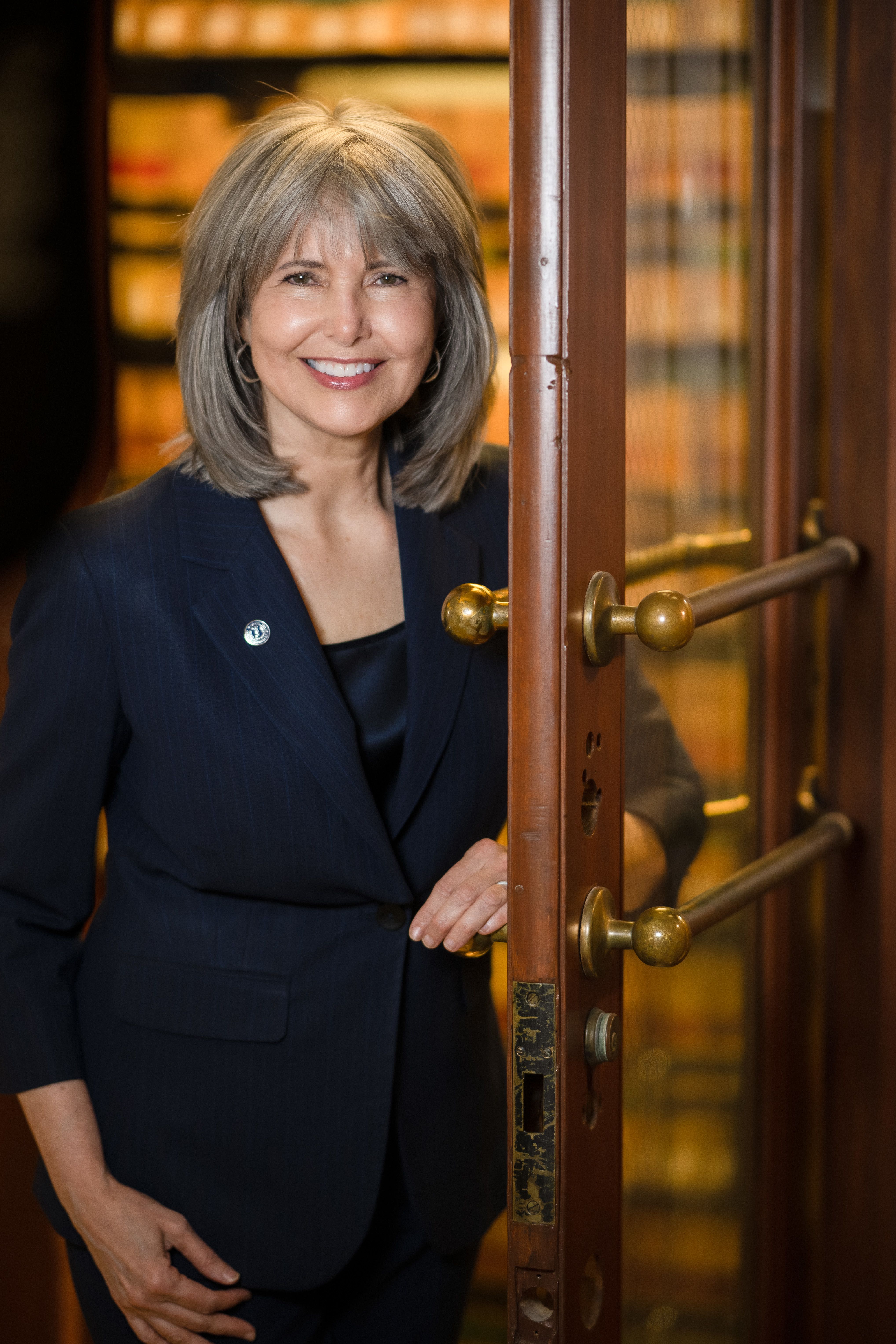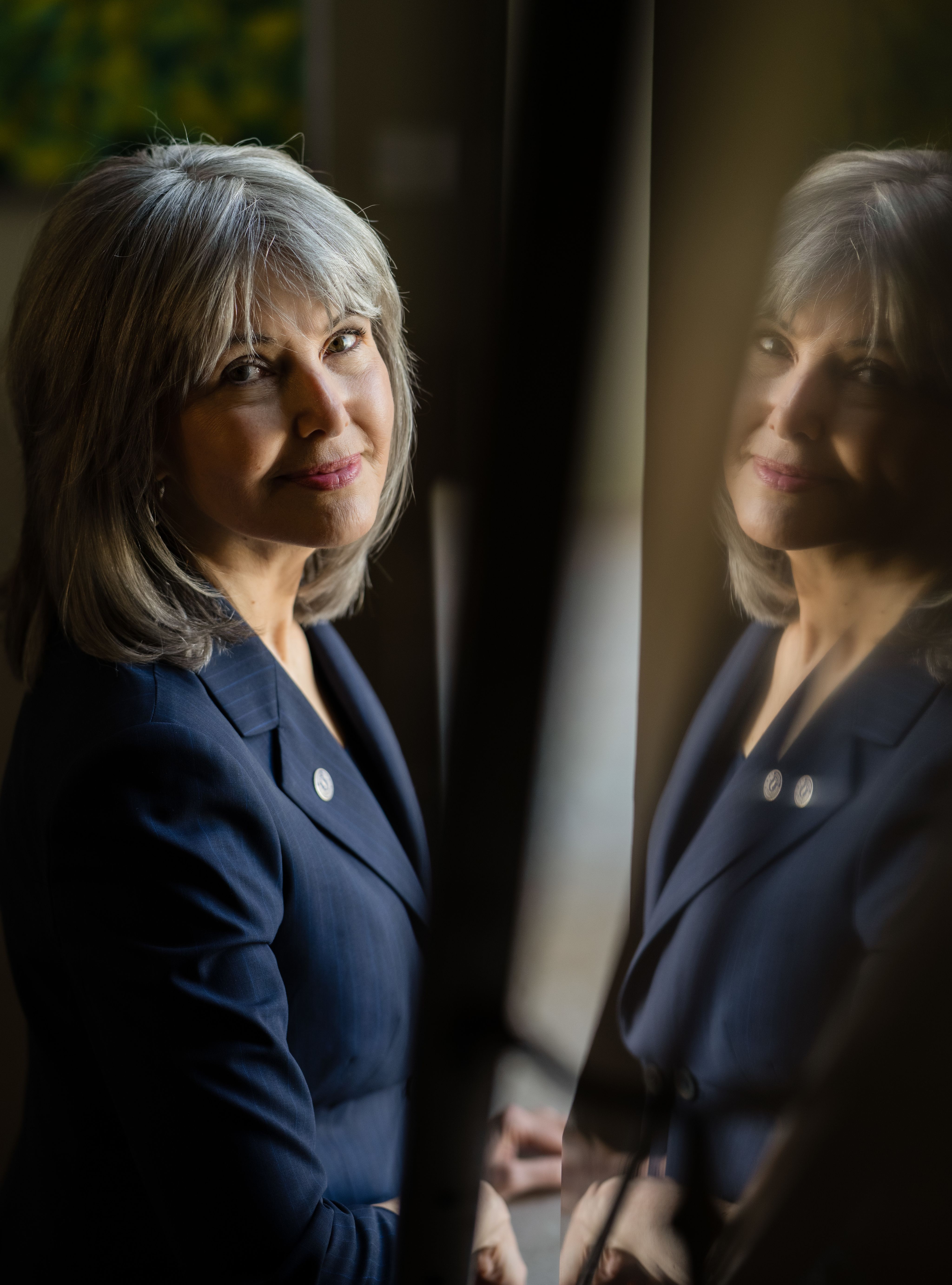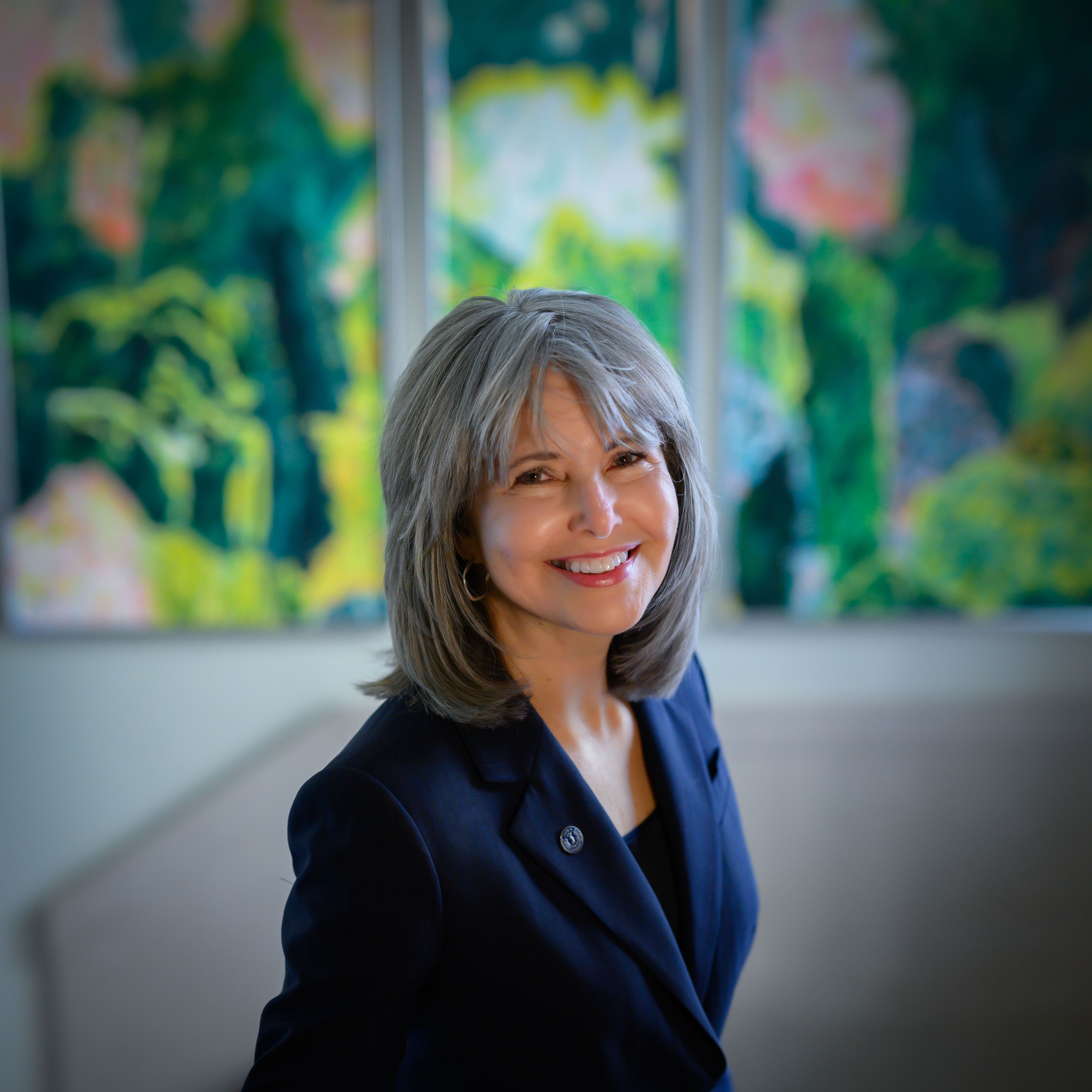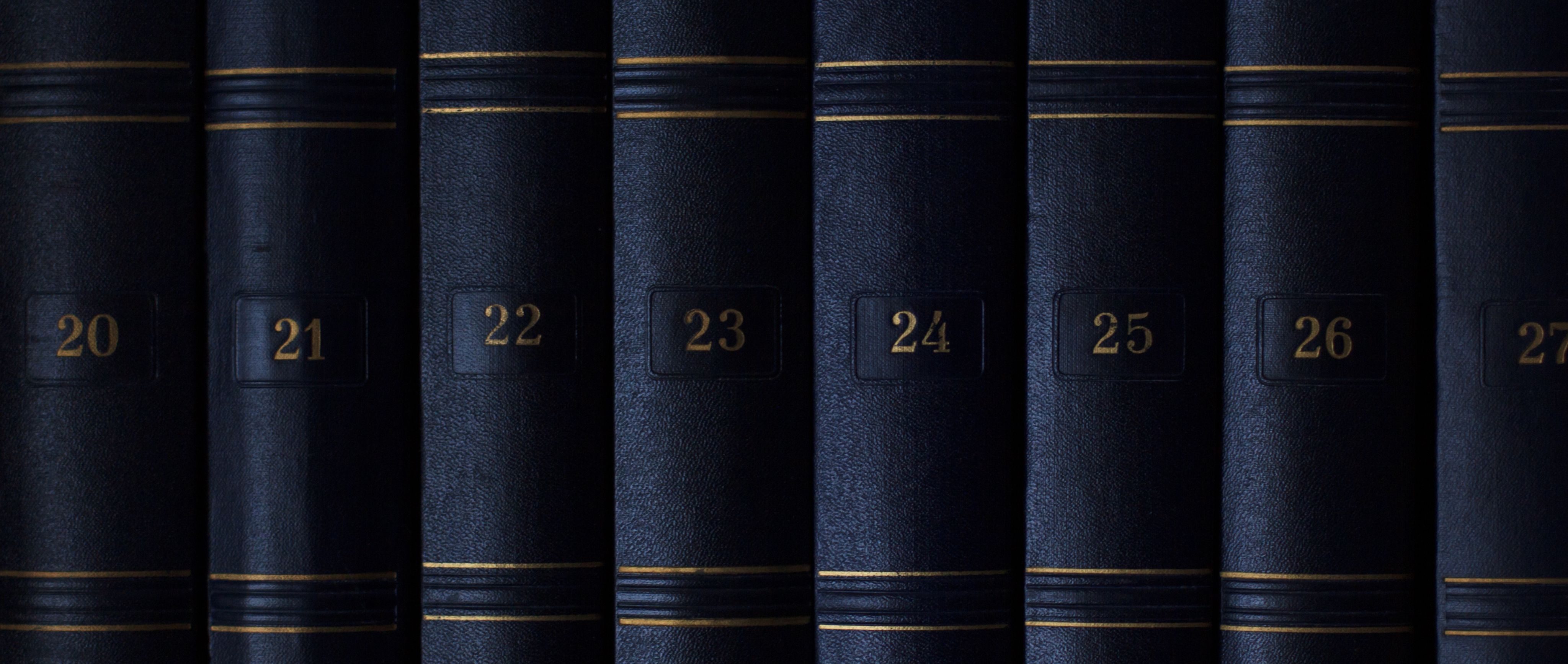Justice
Holly Kirby (’82)

First in her family to earn a JD. First female partner at the legendary Memphis law firm Burch, Porter & Johnson. The first University of Memphis Cecil C. Humphreys School of Law graduate to sit on Tennessee’s highest court. The first woman ever to sit on the Tennessee Court of Appeals.
The trend is pretty clear.
Justice Holly Kirby has never been one to shy away from putting in hard work to find success where others like her have found none.
She was sworn into her current role on the Tennessee Supreme Court by Governor Bill Haslam in 2014, with her investiture being held at the University of Memphis School of Law itself. Prior to that, Justice Kirby served for almost 19 years on the Tennessee Court of Appeals, the state’s intermediate appellate court for civil cases, where she marked one of her many “firsts” as the first ever woman to sit on that court.
Over the course of her storied judicial career, Justice Kirby has presided over a plethora of wide-ranging cases at various levels and authored well over a thousand opinions from appeals all across Tennessee.
Born in Memphis and graduating from high school in Columbia, Tenn., she came back to Memphis to attend college at the University of Memphis, first earning an undergraduate degree in engineering and then staying to earn her law degree and begin her legal career. She began by serving as a judicial law clerk for Judge Harry Wellford while he presided on the U.S. District Court for the Western District of Tennessee and remaining with him as clerk when he was elevated to the U.S. Court of Appeals for the Sixth Circuit. After her clerkship, she joined the Memphis firm of Burch, Porter & Johnson, where she would eventually become the firm’s first female partner in 1990.
In 1995, Governor Don Sundquist appointed Justice Kirby to the Tennessee Court of Appeals, where she again marked a milestone as the first woman to ever serve on that court. She served on that court for close to 19 years before she began her current role on the Tennessee Supreme Court.
Despite her life spent bravely climbing to heights that would have seemed out of reach to many before her, Justice Kirby is widely hailed as fair, down to earth and always one of the friendliest people to interact with.
Though she was the first to accomplish many feats, it’s clear that she’s not resting on her laurels. The next generation of young attorneys will be looking up at her on the bench for years to come, while she inspires them to reach new heights of their own.

Let’s start with your unique combination of University of Memphis degrees. Obviously, you have a law degree from here, but interestingly you also have an undergraduate degree in engineering. Tell me how you ended up pursuing an engineering degree and how that background in the STEM areas perhaps helped you in law school and your legal career.
Actually, I knew I wanted to go to law school before I knew what my undergraduate major would be. I come from a family without a lot of money; my mom was a secretary, and my dad was a traveling salesman. I knew I’d have to find a way to pay for my own undergraduate education and law school, too. At that time, the University of Memphis was heavily recruiting women in engineering. I was good at math and science, and the University offered me a generous Herff scholarship. Also, I figured I could make pretty good money as an engineer to save up for law school. So, I decided to major in engineering.
As it turned out, the UofM law school offered me a generous Herff scholarship as well, so I ended up going directly to law school after I graduated from the College of Engineering. I never worked as an engineer, beyond working summers for engineering firms and the Corps of Engineers while I was in undergraduate school.
My engineering education has served me well. Engineering is a rigorous major.Plus, to prepare for law school, I took the most difficult writing and analysis courses I could in english, political science and liberal arts as electives. From all of these I learned logic, analysis and critical thinking. Also, even though the language for engineering and law are quite different, both are problem-solving disciplines, so the engineering skills I learned translated surprisingly well to the law. All in all, knowledge and training in STEM made me a better lawyer and judge.
You had a unique clerkship experience, in that you began with a judge while he was a federal trial judge, but stayed as his clerk when he became an appellate judge. How was that an important learning experience for you and what lessons did you take away from that clerkship?
In general, clerking for a judge is an irreplaceable experience. Every young lawyer should seek out an opportunity to clerk if possible; it’s experience you can’t get any other way. You end up getting to know judges as people, seeing how they make decisions and understanding how they view the lawyers who appear before them. No matter what kind of law you end up practicing, that knowledge is extremely valuable.
During my clerkship with Judge Harry Wellford, he was elevated from the federal District Court bench to the Sixth Circuit Court of Appeals. The first part of my clerkship was as a District Court clerk for a trial judge who was experienced, confident and decisive. Once Judge Wellford was confirmed for the Sixth Circuit, he had to learn how to be an appellate judge and make decisions as part of a panel. I watched him navigate making decisions with other judges whose philosophy, work style and personality were often very different from his. I greatly respected Judge Wellford, and working with him as he encountered those new experiences was an honor and a joy.
On the District Court bench, Judge Wellford was succeeded by Judge Julia Gibbons, so I also had the opportunity to meet her as a newly appointed District Court judge. In 1982, there were still relatively few women practicing law, so my clerkship allowed me to see from the inside how older judges like Judge Wellford genuinely struggled with how to be gentlemanly, as they understood it, while trying hard to treat women lawyers as equal to male lawyers. I also got to see how elegantly Judge Gibbons handled the older male lawyers, many of whom were skeptical of women in the law. Those experiences were helpful to me as I made my way in the legal community, first as a lawyer and then as a judge.


What drew you to Burch, Porter & Johnson after your clerkship with Judge Wellford? Why did you choose to work there of all the firms in Memphis?

Well, I ended up accepting the offer from Burch, Porter & Johnson even though they sent their offer letter to me postage due! I got a kick out of telling them that, and of course they were mortified. Later, I framed the letter and envelope stamped “Postage Due” in red ink and hung it on the wall in my office.
During my clerkship with Judge Wellford, I interviewed with a lot of well-respected law firms. Somehow, the whole ethos of Burch Porter seemed right for me. I knew from my judicial clerkship that the firm’s lawyers were widely regarded as smart and ethical — skilled litigators who also valued professional courtesy. The firm had a heritage of public service; Lucius Burch, Mike Cody and Charlie Newman had been active in civil rights and other causes, and Mike Cody had served as U.S. Attorney. From my interview, the lawyers all valued having a rich personal life in addition to a rewarding legal career. And overall, I just liked the folks there. I still do.
One of your practice areas/specialties at Burch Porter was sexual harassment cases, at a time when that issue was not really a prominent legal focus or in a culture that is as knowledgeable about the topic. How did you end up specializing in that area and what was it like to work in that area of the law at that time? How was the specialty viewed professionally at that time?
When I began working at Burch Porter in 1983, I didn’t know what type of law I wanted to focus on, so I worked with a lot of lawyers in a lot of different areas. One of the lawyers was the firm’s only specialist in employment law, and I worked with him on a couple of cases. He then decided to move to Tampa, and suddenly, as a second-year associate, I became the firm’s senior — and only — employment lawyer. I got a lot of responsibility very quickly and had to learn on the fly.
One of the areas that was emerging at that time was sexual harassment. For perspective, this was well before Justice Clarence Thomas’s 1991 confirmation hearings, with testimony from Anita Hill on sexual harassment, so I was diving into largely unknown territory. I did mostly defense but also some plaintiff’s work. I liked it because it was intellectually challenging, but also very people-oriented, and the factual situations that arose were certainly interesting! The work was also varied; in addition to classic litigation, I did training for clients to educate supervisors on what to avoid, and conducted internal investigations when employees accused supervisors of harassment. Many male supervisors were genuinely perplexed that things they’d been doing routinely for years had suddenly become a violation of the law.
I loved working on sexual harassment matters, and employment law in general. I got to teach men and women and people of different backgrounds and ethnicities to work together with respect, with appropriate boundaries and to focus on valuing the quality of each other’s work. I found it very rewarding.

Throughout your time as a judge, at both the appellate and Tennessee Supreme Court levels, what areas of Tennessee law do you feel your rulings have impacted and what do you try to bring to a case as a judge?
As a justice now, and as a judge on the Court of Appeals, I’ve been a generalist, in the broadest possible sense. So necessarily any impact is widely dispersed. But the cases that stay on my mind the most are those involving children, such as termination of parental rights, child custody, juvenile justice and criminal defendants who are children. In all of them, I work hard to respect the laws enacted by our legislature and bring common sense and compassion to each case.
What stands out in your memory about your experience at Memphis Law?
I had the best class ever! I had a terrific small study group and the classmates I studied with are still dear friends. All of my classmates were supportive and rooted for each other’s success. Many of them are still practicing in Tennessee and doing well.
I was the notes editor for the Law Review, which is a hard position because you’re editing the work of your classmates. But the members of the Law Review readily accepted my editing and we worked hard together and learned a lot. I love Law Review and all law students should do it if they get the chance!
My professors really got to know us and many went out of their way to help us, while we were in law school and for years afterward. Dean Nicholas White took a special interest and looked for opportunities for me, and Professors Claude Coffman and Larry Pivnick taught us all valuable life lessons in keeping everything in perspective. I remember many of them with respect and affection.
How has the legal world changed since you’ve been on the bench? And what advice would you give to a current law student or recent graduate looking to enter the profession in what many have cited as a new era in the legal profession?
The legal world has changed a lot since I’ve been on the bench. Many of the changes have been brought about by innovations in technology. They’ve opened up exciting new possibilities for lawyers, but in some ways, they’ve contributed to increased isolation, especially among younger lawyers.
A couple of observations. I’m the court’s liaison to the Board of Professional Responsibility, and I’ve seen an increase in ethics complaints about lawyers who’ve been licensed fairly recently. Many of them are practicing essentially on their own, and they get into trouble from ignorance about how to run a law practice, deal with clients and so on. Some of the issues involve substance abuse or emotional turmoil, sometimes stemming from being overwhelmed by the pressure of practicing law.
I also worked on a mentoring program the court initiated several years back, and ultimately scrapped. There was no lack of potential mentors; many experienced lawyers were interested and willing to volunteer to work with younger lawyers. Unfortunately, there was little or no interest on the part of younger lawyers, some of whom were in solo practice, working out of their homes and cars with a smart phone and maybe a tablet of some kind.
These two things are related. When I went on the bench, younger lawyers were more likely to practice with other lawyers, at least in shared office space. This created natural opportunities to talk with older lawyers about challenges, clients, pressures and problems. Young lawyers now are more isolated, trying to figure it out on their own and sometimes ending up in trouble.
If you are a new-ish lawyer trying to navigate law practice without a lot of support, do two things. First, join your local bar association. It’s an instant community of folks who share a lot of the pressures you’re experiencing. Second, ask a more experienced lawyer to lunch or to grab coffee. I’ll bet they’ll be happy to spend a little time with you. You may come away with better insight into how to deal with difficult clients, money issues and trust accounts. And who knows, maybe you can give them a little help in how to use the latest technologies.


